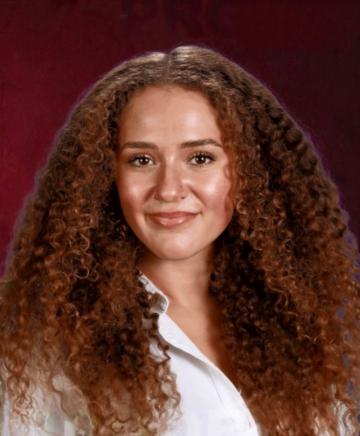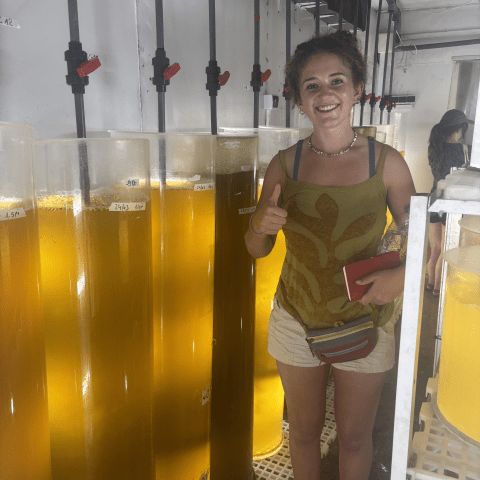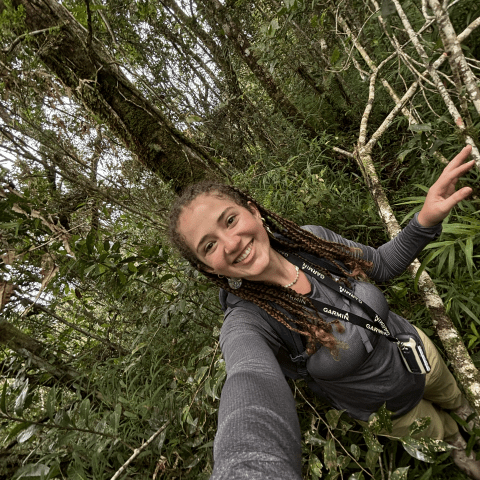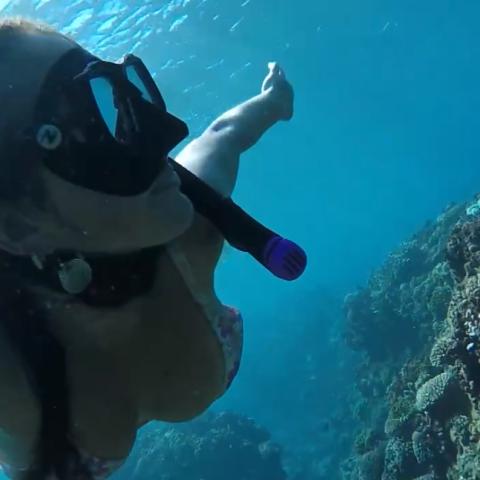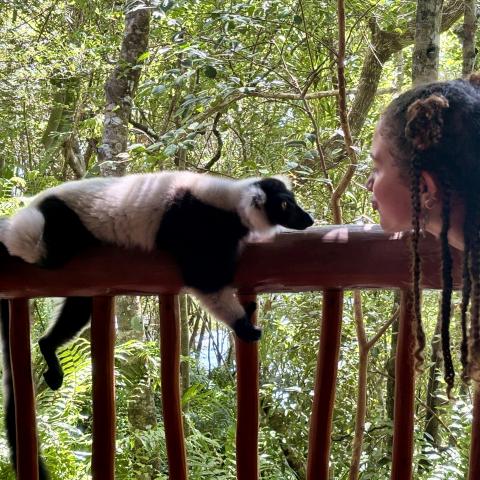High School
New Bedford High SchoolUndergraduate Education
B.A. in Integrative Biology from Harvard College, 2025Profile
Perched on a raft in the ocean, farming oysters in briny waters with salt crystals drying on her skin, the rhythms of the tides are a constant force in Raquel Reis’s life. Exuberant and extroverted, Raquel always has many irons in the fire, but you don’t need to look at any of them very long to see the connection to her greatest love: the sea.
Growing up in New Bedford, MA, Raquel learned about species extinction and the growing scarcity of water resources from her older sister, Thoreau Scholar alumna Skylah Reis. “I thought it was the scariest thing ever when I was twelve.” There is no fear in Raquel’s voice today when she relates that story. Her natural optimism drives her to study the ocean and environmental justice. Instead of worrying, she wonders how to fix things. “I default to the positive. It isn’t all doom and gloom!”
Raquel has always had a love of teaching and sharing her enthusiasm for science. She is especially motivated by inspiring the minds of young students. During the summer, Raquel has volunteered at Sea Lab Marine Science Education examining and communicating issues facing the fields of oceanography, marine biology, and Earth science. “Encouraging passion is critical. When one becomes excited by a topic, learning the facts and gaining problem-solving skills become more of a hobby than a chore. Last summer I had the privilege of designing and teaching all the lesson plans for 2nd-11th grade students at Waquoit Bay Summer Science School, and I could see the difference it was making for these students.”
While the sea is a common denominator in Raquel’s life, she has approached the study of it from different angles. Throughout high school and during her first year at Harvard, she looked at the world through an Earth science lens. After her first year in college, she was eager to get a lab position with a researcher in the Earth and Planetary Sciences Department. “I had no doubt that the fields of geology and Earth science were where I belonged. I dove into chemistry and physics. I focused on abiotic systems and imagined spending my life on this track.” But it took being a “ghost student” in an extra class to raise unexpected questions about her plans.
Raquel had signed up for a fifth course, a seminar on natural history museums. Told she could not audit it and had to drop it, she directly arranged with the professor to sit in on the class even though there would be no record of her attendance. “Professor Chuck Davis completely changed my outlook on the natural world. Listening in on his weekly lectures about plants, fungi, animals and more made me eager to pursue a career focused on systems-level thinking, where understanding the interactions between living organisms and the nonliving world is essential.”
Pursuing her primary interest in Earth sciences, she decided to add Integrative Biology as a secondary concentration. Raquel stayed on track until the fall of her junior year when a seemingly random decision altered her focus. “Out of the mid-December air came the genius idea: Go to Madagascar.” Her life was about to change. All practical and reasonable objections were overcome, and Raquel set off for three months to the School for International Training’s Biodiversity and Natural Resources Management program. It was a transformative move. The first two months included French and Malagasy language and biology classes. The third month was a wild card—independent research. Raquel credits the Thoreau Foundation with helping pull the pieces of that final month together. Her mentor, Dr. Jennifer Galvin who leads the foundation, put her in touch with Thoreau Scholar alumnus Dr. Christopher Golden, a professor at the Harvard T.H. Chan School of Public Health. Chris has been working in Madagascar since 1999 and founded MAHERY (Madagascar Health and Environmental Research) in 2004.
“I spent my month of independent research in southwest Madagascar studying coral reefs. The project was focused on coral farming, and I worked in both an in-situ and ex-situ coral nursery. I dove through crystal clear waters, lived among mangroves and chameleons, and participated in meaningful research that resonated deeply.” She also had close encounters with scorpion fish, which are extremely poisonous, reminding her that she was far away from medical care. Daily technology was equally distant, but Raquel was in her element. She worked closely with Dr. Gildas Todinanahary at the Belaza Marine Station and on the remote Sarodrano peninsula. Every day Raquel knew that she was contributing to viable, useful research, not simply fulfilling an
academic requirement. Her work was grounded by daily observations of local people going to sea in pirogues and being united with their environment.
Living in Madagascar and witnessing the intimate connections of life on a coral reef while being part of a productive research team gave Raquel a renewed focus and reaffirmed purpose. It was clear that her life’s work would keep her connected to the systems of the sea. With help from the Thoreau Foundation and some course requirement tweaking, she flipped her major and minor to graduate with Integrative Biology as her primary area of study.
The tidal zone is one of the toughest places on this planet to live—the ebb and flow is inescapable. This ceaseless rhythm reflects the rush of knowledge and sharing that runs fierce in Raquel. After college, she plans to continue connecting with coastal communities and deepening her knowledge of marine biology. But Raquel will not keep what she learns to herself and will always pay her work forward to inspire others. “I know how influential moments spent learning with others who share a passion for the ocean can be. I will continue to share my knowledge and experiences with others.” Raquel’s vision for the future remains steadfast: “I work for a planet with fertile soil, plastic-free oceans, clean air, and to inspire people to continue to better our natural world.”
